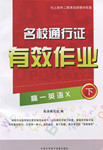题目内容
_______ the best in a recent science competition, the three students were awarded scholarships ________21,000 dollars.
A. Judging; would total
B. To be judged; totaled
C. Having judged; to total
D. Judged; totaling
 名校通行证有效作业系列答案
名校通行证有效作业系列答案假定你是我校高三学生李华,在学校看到如下通知,请根据通知的内容和写作要点向学校写一封申请信:
HOST FAMILIES WANTED Teachers and students from Central High School phoenix will visit our school two weeks later. Host families are wanted to accommodate our friends. REQUIREMENTS: ◇ Can communicate in English. ◇ A SEPARATE room is a MUST. ◇ A private car is preferred. If interested, please send your APPLICATION IN ENGLISH to the Office of the principal before THURSDAY. Please consult us for any further information. |
写作要点:
1.你对参与该活动的认识;
2.你的优势;
3.作为接待家庭的打算。
注意:
1.可根据内容要点适当增加细节,以使行文连贯;
2.词数120字左右。
Dear Sir or Madam,
I am Li Hua from Class One, Senior Three. ________________________________________
_______________________________________________________________________________
_______________________________________________________________________________
_______________________________________________________________________________
_______________________________________________________________________________
_______________________________________________________________________________
_______________________________________________________________________________
_______________________________________________________________________________
Yours sincerely,
Li Hua


 d blinded them to the need for change. Finally, after butting heads with several senior executives (主管) many times, she left the company. But she found that she hadn’t left her resentment, frustration, and anger behind when she resigned.
d blinded them to the need for change. Finally, after butting heads with several senior executives (主管) many times, she left the company. But she found that she hadn’t left her resentment, frustration, and anger behind when she resigned.